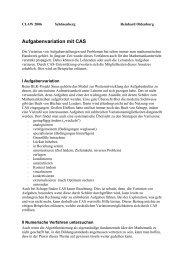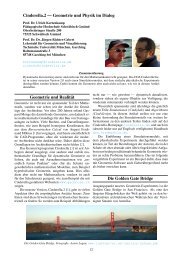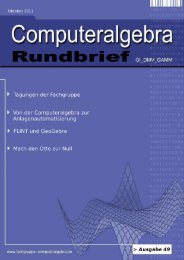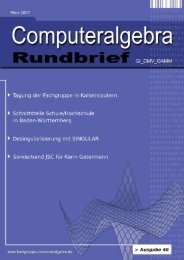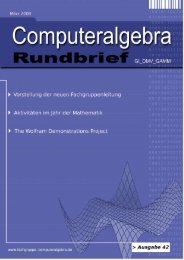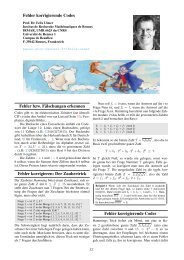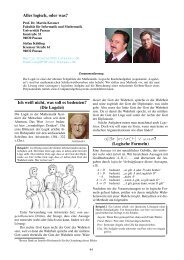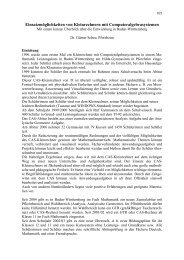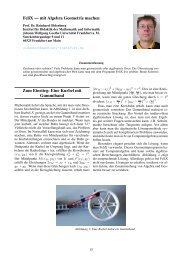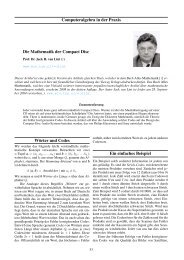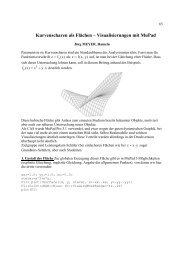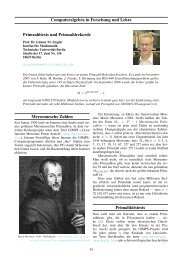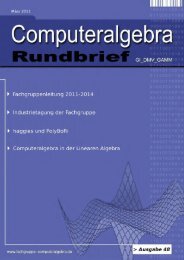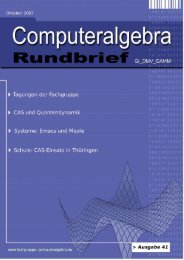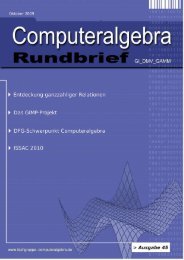Computeralgebra-Rundbrief - Fachgruppe Computeralgebra
Computeralgebra-Rundbrief - Fachgruppe Computeralgebra
Computeralgebra-Rundbrief - Fachgruppe Computeralgebra
Erfolgreiche ePaper selbst erstellen
Machen Sie aus Ihren PDF Publikationen ein blätterbares Flipbook mit unserer einzigartigen Google optimierten e-Paper Software.
cher’s Edition which is specifically customized for high<br />
school use, and CalculationCenter which is a version of<br />
Mathematica optimized for easier use on less demanding<br />
applications. As far as I am aware, MuPad and<br />
Maple do not offer schools anything other than their<br />
standard product.<br />
Perhaps this is a question of perception. Maybe our<br />
marketing has not been as successful in Germany as it<br />
has in other countries.<br />
CAR: Finally, what is the most important new feature<br />
in your eyes?<br />
TWJ: I am very pleased with our support for sparse<br />
matrices. This is something that we had debated and<br />
worked on for many many years. We knew what the<br />
functionality should do–solving systems, carry out multiplication,<br />
etc.–but to design the interface to the functionality<br />
to be correct is not so trivial. Sometimes people<br />
think that we spend too much time worrying about these<br />
design issues, but this is often a very narrow view which<br />
Kurzmitteilungen<br />
Umstieg mit Problemen (Thomas Hahn)<br />
is mainly relevant if you just want to solve one class of<br />
problem. In the long term, designing a good interface is<br />
very worthwhile, especially for a very general system.<br />
Sparse matrices are of course a key technology that<br />
supports many areas of computation, especially if you<br />
want to solve very large computation problems.<br />
If I could mention another new feature I would<br />
also mention a meta-feature, our advanced documentation<br />
system that we are starting to develop. This is<br />
an adjunct to TThe Mathematica Booktthat provides<br />
a much more in-depth description of the functionality<br />
and how to use it. Users of the Mathematica system<br />
have been requesting this for many years. We will be<br />
adding to this as we develop the system. For an example,<br />
see http://documents.wolfram.com/v5/<br />
Built-inFunctions/AdvancedDocumentation/<br />
LinearAlgebra/.<br />
CAR: Tom, thanks a lot for your answers!<br />
Mathematica 5 wurde angepriesen als ” an advanced algorithm release with a large number of major new technologies.“<br />
Leider hat das nicht nur positive Seiten, so geht neuerdings vieles anders oder fehlerhaft. Der Umstieg von<br />
Mathematica 3 auf 4 war jedenfalls deutlich schmerzloser. Im Folgenden sollen an wenigen Beispielen Schwierigkeiten<br />
beim Wechsel illustriert werden.<br />
Im einfachsten Fall haben Optionen andere Defaults. So hat Eigenvalues neuerdings die Optionen Cubics<br />
-> False und Quartics -> False, und der Benutzer wundert sich, dass in den Eigenwerten plötzlich<br />
Objekte der Form Root[f, k] auftreten, die die Nullstellen von Polynomen darstellen.<br />
Schwerwiegender sind da schon Fehler in der symbolischen Umformung, so hat z. B. Apart einen Vorzeichenfehler,<br />
demzufolge Simplify[expr - Apart[expr]] nicht immer Null ergibt. Ein nicht einmal<br />
besonders langer Ausdruck (LeafCount 597), für den dieses Problem auftritt, ist hier nicht abgedruckt, aber auf<br />
Anfrage vom Autor zu erfahren. Kommentar vom Wolfram-Support: ” This error has been fixed for the internal<br />
development version of Mathematica. We have not yet determined when this correction might become available in<br />
a released version of Mathematica.“<br />
Aber auch die Numerik hat noch ihre Schwierigkeiten: PolyLog[2, 0.5400327350919246451521<br />
- 0.7775582066618448604596 I] liefert so z. B. zunächst ” Recursion limit exceeded“ und, wenn man<br />
selbiges hochsetzt, 0. 10 2 + 0. 10 2 I, während die Variante mit machine precision ganz anstandslos 0.3584<br />
- 0.953611 I ausspuckt.<br />
Selbst einfache Funktionen verwundern. Legt man für ein Symbol mehr als 17 Definitionen an, im einfachsten<br />
Fall etwa mit Array[(f[#] := g)&, 18], so liefert Definition[f] bzw. ??f eine Liste, in der Set (=)<br />
statt SetDelayed (:=) steht.<br />
Wer seinen Upgrade noch bis zum nächsten Release hinauszögern kann, wird sicherlich viele Bugs ausgemerzt<br />
finden. Insgesamt hält sich die Begeisterung in Grenzen, 1250 Bucks pro Upgrade einer Netzwerk-Lizenz für viele<br />
Bugs gezahlt zu haben.<br />
Und wenn jemand nun zu seiner alten Version 4 zurückkehren will (lizenzrechtliche Fragen seien hier einmal<br />
ausgeklammert): man muss unter Linux auch wieder den alten License Manager installieren, denn Linux-Lizenzen<br />
sind nunmehr in Klasse A (vorher Klasse X).<br />
22



